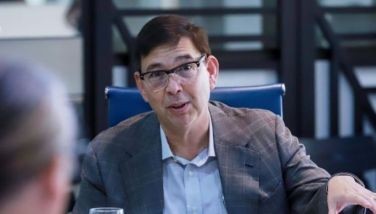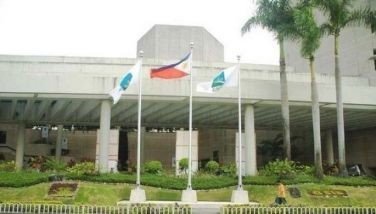Digital lifestyle

Just recently, a friend asked why I prefer to book a vehicle service from Grab instead of using my car.
Isn’t the answer obvious? With the horrendous traffic in Metro Manila and the perennial problem of finding a parking slot, a Grab ride provides me the solution.
Unfortunately, especially during peak hours of the day, booking a Grab ride can be cumbersome. I distinctly remember two Christmas parties when I was unfashionably and terribly late because no one would accept my booking.
I have been hooked to the digital lifestyle. When the pandemic broke, my computer and mobile phone became my lifeline. I conduct my classes and attend press briefings using the Zoom app, interview people with the use of video chat platforms, shop for food and even non-essentials from online stores, pay my bills using online payment means, do bank transactions using the banks’ mobile apps, attend Zumba classes online or simply view available YouTube exercise videos, have online consults with doctors, join other self-improvement classes that are available online, watch movies on Netflix, among others.
Nothing has changed, even with the easing of movement restrictions.
A friend visiting the country said that compared to her last visit to Manila, traffic in Metro Manila has improved. Maybe because a lot of people still go about their everyday lives digitally. Many companies have realized that their employees’ productivity has not diminished just because they work from home which is the reason why either these firms have continued with the WFH setup or have implemented hybrid work setups, like requiring their workers to be in the office maybe twice a week. Some schools especially those in the tertiary and post-graduate levels are either on a full online class or a hybrid one.
The pandemic has fast-tracked the digitalization and digitization of the economy. Both the young and old have become digitally savvy and have realized the convenience of embracing modern technology.
Why waste your time driving when you can go from one place to another by a few clicks on your phone using the Grab app, that is if someone will accept your booking.
Why are there very few Grab-accredited vehicles when the demand for transport network vehicle services or TNVS is increasing?
A few phone calls gave me the answer.
During the pandemic, many owners of vehicles that are accredited by transport network company Grab who borrowed money from the banks to purchase their vehicles were unable to pay for their loans, as a result of which they lost their mortgaged vehicles. Due to the lockdowns and mobility restrictions, those who were relying on the income that they get from providing Grab ride services found themselves with little to no bookings at all for several months.
One report revealed that there are around 20,000 TNVS providers remaining. But while the number of providers has significantly gone down, demand has soared.
According to Grab Philippines senior director for operations Ronald Roda, demand for their services already surpassed pre-pandemic levels as early as last December. In December, Grab in fact was able to service only less than half of the passenger demand volume.
So why not just accredit more TNVS providers?
The Land Transportation Franchising and Regulatory Board (LTFRB) announced that in order to strengthen the local ride-hailing sector, 100,000 TNVS licenses across the country will be made available, compared to the 65,000 limit before the pandemic. This will not be exclusive to Grab though.
The 100,000 TNVS licenses unfortunately is still too small, considering that around 35,000 would go to the provinces while the remaining 65,000 will be for the Greater Metro Manila area which includes Rizal, Bulacan, Laguna and Cavite. And the licenses are for both cars and motorycycle taxis.
Unlike public utility vehicles like jeepneys, taxis and buses where the fleet owner needs to submit only one filing for the entire fleet, in the case of TNCs like Grab, each TNVS or accredited vehicle which is considered as an independent operator has to secure its own franchise from the LTFRB.
But securing a franchise for each and every TNVS provider is a nightmare considering that the LTFRB can only process and hear 100 applications per day. We also learned that TNVS operators have to submit at least 17 documents to the government regulatory agency, including bank documents if the vehicles are mortgaged which take as long as three months to secure.
From the LTFRB website, we can see that some of these documents that have to be submitted by franchise applicants include the verified application form, photocopy of the vehicle’s official receipt and certificate of registration (OR/CR), proof of Filipino citizenship, formal offer of evidence, proof of existence of garage, proof of financial capability such as proof of bank deposit of P20,000 for each unit, recent photos of the vehicle to be used, DTI business name registration, BIR certificate of registration, certificate of accreditation from the TNC, NBI and police clearances, proof of publication, affidavit of publication, copies of publication, affidavit of attestation to prove authenticity of documents submitted as part of formal offer of evidence, among others.
If indeed the LTFRB would allow 100,000 TNVS licenses, processing and hearing all these applications will take forever.
And why put a cap on TNVS licenses in the first place? The number of providers should be dictated by demand, not by the government. And why all these requirements when the government is pushing for ease of doing business?
State of Subic Freeport
Subic Bay Metropolitan Authority (SBMA) chairman and administrator Rolen Paulino will be delivering the state-of-the-freeport address or SOFA on March 28 at the Subic Bay Exhibit and Convention Center, a much-anticipated event by stakeholders of the Subic Bay Freeport Zone as well as by the different sectors and local government units around the area.
The SOFA is an annual gathering organized by the Subic Bay Freeport Chamber of Commerce and serves as the official platform through which the SBMA chief reports on the status of business activities inside the freeport zone. During the event, Paulino is also expected to apprise stakeholders on new investments, policies, accomplishments, future plans, expectations on economic and business growth, among others.
This year’s SOFA will be the 16th and the first one to be delivered by Paulino.
The SBMA gives the surrounding LGUs the revenue share from the corporate tax every semester which is two percent of the five-percent special tax it collects from business locators in the freeport zone, with the remaining three percent going to the national government.
The Subic Bay Business Expo, which will have the SOFA as its highlight, will be held from March 27 to 28 and will feature the different products and services offered by Subic Bay locators. A business to business (B2B) activity will also be conducted during the event to create an opportunity to meet business partners and clients.
For comments, e-mail at [email protected]
- Latest
- Trending




























